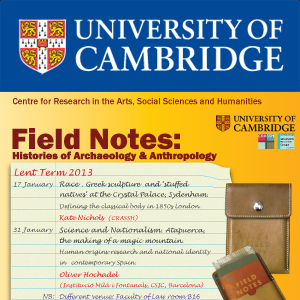Field Notes - 3 March 2014 - Egyptian Archaeology under British Military Occupation (1882-1956)
Duration: 46 mins 34 secs
Share this media item:
Embed this media item:
Embed this media item:
About this item

| Description: |
Disciplinary Formation, Imperialist Gender, Nationalist Class: Egyptian Archaeology under British Military Occupation (1882-1956)
Prof Stephen Quirke (ULC) Discussant: Mimi Winick (Rutgers, The State University of New Jersey) Abstract In his 1996 History of Archaeological Thought, Bruce Trigger described archaeology across Africa as neo-colonial. Two decades later, in the political economy of knowledge, de-colonisation remains one paradigm shift that never materialised – nowhere more visibly than in the study of other places/times. With a smaller scale of population, narrowly bounded disciplines offer opportunities to analyse this continuity, and to identify the trump cards of domination. In Egyptology established practitioners such as the philologist Georges Posener have voiced concern over self-isolation; in its current practice, the sub-discipline seems torn between the First World technocracy of archaeological fieldwork, and an anti-theoretical positivism in research into ancient written sources. From the history of nineteenth and twentieth century archaeology, two particular liberation motifs or genres might be re-interpreted as implicit strategies of domination: praise of women archaeologists, in a first wave feminist style; and praise of Egyptian Egyptologists, in nationalist historiography. Is it possible to develop a self-critique in either area, against normative self-images of heroism? Is a war of position possible against the hegemonic structures of both science and its civil society? |
|---|
| Created: | 2014-03-10 10:57 |
|---|---|
| Collection: | Field Notes Seminar |
| Publisher: | University of Cambridge |
| Copyright: | Glenn Jobson |
| Language: | eng (English) |
| Keywords: | CRASSH; Field Notes; |
| Abstract: | Disciplinary Formation, Imperialist Gender, Nationalist Class: Egyptian Archaeology under British Military Occupation (1882-1956)
Prof Stephen Quirke (ULC) Discussant: Mimi Winick (Rutgers, The State University of New Jersey) Abstract In his 1996 History of Archaeological Thought, Bruce Trigger described archaeology across Africa as neo-colonial. Two decades later, in the political economy of knowledge, de-colonisation remains one paradigm shift that never materialised – nowhere more visibly than in the study of other places/times. With a smaller scale of population, narrowly bounded disciplines offer opportunities to analyse this continuity, and to identify the trump cards of domination. In Egyptology established practitioners such as the philologist Georges Posener have voiced concern over self-isolation; in its current practice, the sub-discipline seems torn between the First World technocracy of archaeological fieldwork, and an anti-theoretical positivism in research into ancient written sources. From the history of nineteenth and twentieth century archaeology, two particular liberation motifs or genres might be re-interpreted as implicit strategies of domination: praise of women archaeologists, in a first wave feminist style; and praise of Egyptian Egyptologists, in nationalist historiography. Is it possible to develop a self-critique in either area, against normative self-images of heroism? Is a war of position possible against the hegemonic structures of both science and its civil society? |
|---|---|

